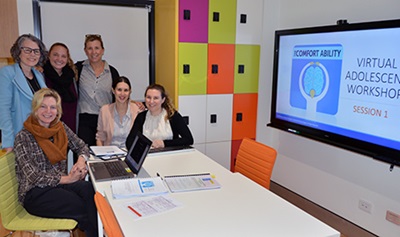New innovative program for chronic pain

Image | Pain team at PCH: (L-R) Anna Hilyard, Julia Kingsley, Megan McKee, Leasa Ashton, Emily McGurk, Emma Woods.
PCH has partnered with Boston Children’s Hospital and Harvard University to launch The Comfort Ability Program in Western Australia. This internationally recognised intervention will help children and families learn how to manage chronic or recurring pain.
Site Director and APA Pain Physiotherapist Anna Hilyard is a Churchill Fellow specialising in digital health. For the first time in Australia, the program will be available in both online and face to face formats. Anna’s Churchill project has been focused on the establishment of an online pain program to improve treatment access for families in remote and regional areas. The online Comfort Ability Program offered by PCH will allow families to participate from their home, school or workplace. The videoconference format will also offer more flexibility for families living closer to PCH. The unpredictability of COVID restrictions, and the potential for snap lock downs, impacts face to face treatment planning. The online Comfort Ability Program allows PCH to plan treatment with certainty.
“Too many children live their day-to-day lives in chronic or persistent pain,” said Anna Hilyard, who is also the Program Coordinator of Perth Children’s Hospital Complex Pain Service.
"Chronic pain can wreak havoc in the lives of children, interfering with school, sleep, friendships, and activities. Parents and caregivers are also deeply affected; they may miss weeks of work caring for their child and struggle with feelings of helplessness. This program will be a powerful tool to help these families help themselves. We currently offer an intensive interdisciplinary pain program at PCH but places are limited. The Comfort Ability Program will increase access to treatment and we are delighted to be able to offer it both face to face and online options."
The Comfort Ability Program is an interactive treatment program to help adolescents and their parents or caregivers learn how to better manage chronic pain. The families will work with a team of highly skilled Clinical Psychologists, Occupational Therapists, and Physiotherapists. They provide families with a foundation for understanding the various ways psychological interventions can improve pain management. It also provides adolescents and their families with the concrete skills necessary for improved emotional, social and physical functioning.
Few people realise the true scope of chronic pain in paediatrics. Conservative prevalence rates suggest that one in four children will have an episode of chronic pain, lasting three months or more, before reaching adulthood. This group is largely comprised of kids and teens with musculoskeletal pain, chronic neuropathic pain, persistent post-surgical pain, headaches, and gastrointestinal pain.
The group-based program provides pain education, teaching kids and parents how the nervous system works and why persistent pain can be such a challenging problem to overcome. Beyond education, the program is designed to arm families with a set of research proven mind, body and behavioural interventions that can reduce pain and improve day-to-day function.
"Parents and kids walk away understanding the physical and psychological complexity of pain, and importantly, with a core set of concrete skills they can immediately be put to use," said Rachael Coakley, PhD, Director of Clinical Innovation and Outreach at the Pain Treatment Service in the Department of Anesthesiology, Perioperative and Pain Medicine at Boston Children’s Hospital and the founder of the Comfort Ability Program. “It’s critical for families to learn that the recovery from persistent pain takes a comprehensive approach; in other words, medications alone are seldom the answer."